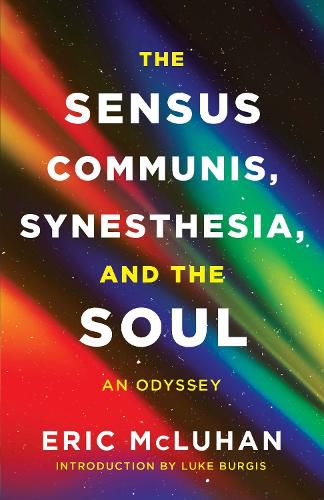Readings Newsletter
Become a Readings Member to make your shopping experience even easier.
Sign in or sign up for free!
You’re not far away from qualifying for FREE standard shipping within Australia
You’ve qualified for FREE standard shipping within Australia
The cart is loading…






McLuhan takes up his father Marshall's mantle by marrying communications and religion in this journey through the senses
In this essay of extraordinary scope and depth, Eric McLuhan explores faith as a form of knowing. He does so against the backdrop of preliterate man's concrete, bodily submersion in the putting on of poetry and drama (the practice of mimesis) and post-literate man's bodiless submersion in electronic communication, in which sender and receiver are everywhere and nowhere at once. In traversing the Aristotelian and Medieval concept of sensus communis, he examines synesthesia as, in effect, its operating system and charts the modern and contemporary mandate to embrace the discarnate. He washes up on the shore of religion as he uncovers a trinity of knowledge, that is, three kinds of sensus communis-the five physical senses, the four intellectual senses of Scripture (historical, allegorical, tropological, and anagogical), and the three theological senses (faith, hope, and charity)-each of the three complete in itself yet interacting with one another. A fascinating odyssey that will dazzle the senses.
$9.00 standard shipping within Australia
FREE standard shipping within Australia for orders over $100.00
Express & International shipping calculated at checkout
McLuhan takes up his father Marshall's mantle by marrying communications and religion in this journey through the senses
In this essay of extraordinary scope and depth, Eric McLuhan explores faith as a form of knowing. He does so against the backdrop of preliterate man's concrete, bodily submersion in the putting on of poetry and drama (the practice of mimesis) and post-literate man's bodiless submersion in electronic communication, in which sender and receiver are everywhere and nowhere at once. In traversing the Aristotelian and Medieval concept of sensus communis, he examines synesthesia as, in effect, its operating system and charts the modern and contemporary mandate to embrace the discarnate. He washes up on the shore of religion as he uncovers a trinity of knowledge, that is, three kinds of sensus communis-the five physical senses, the four intellectual senses of Scripture (historical, allegorical, tropological, and anagogical), and the three theological senses (faith, hope, and charity)-each of the three complete in itself yet interacting with one another. A fascinating odyssey that will dazzle the senses.